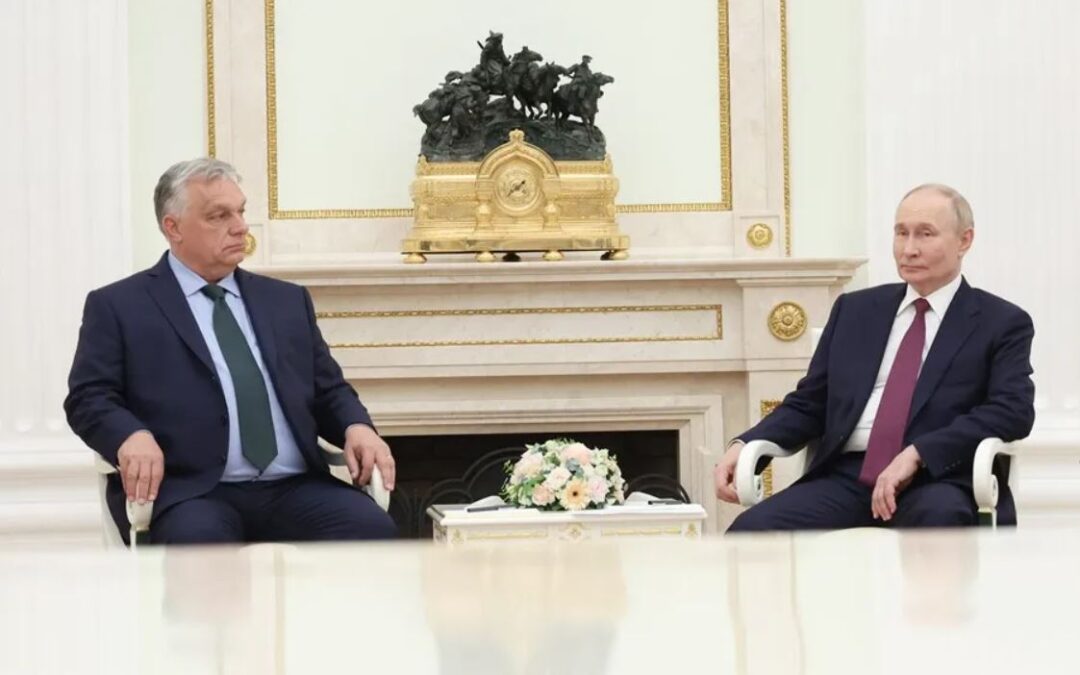Brussels – The European Union (EU) distanced itself this Friday from the meeting that Hungarian Prime Minister, Viktor Orbán, held today with Russian President, Vladimir Putin, stating that he has no mandate to go to Moscow and demanding “unity” with his European partners in the face of the war in Ukraine.
“Prime Minister Viktor Orbán’s visit takes place exclusively within the framework of bilateral relations between Hungary and Russia,” said the EU High Representative for Foreign Affairs, Josep Borrell, in a statement.
The EU’s chief diplomat added that the fact that Budapest holds the rotating presidency of the EU since July 1st “does not imply any external representation of the Union,” as that function belongs to both the High Representative himself and the President of the European Council, Charles Michel.
Precisely Michel wrote yesterday a message on the social network X reminding the EU’s official position on the war: “Russia is the aggressor, Ukraine is the victim. No discussion on Ukraine can take place without Ukraine.”
In the same vein, the President of the European Commission, Ursula von der Leyen assured on the same platform that “only unity and determination will pave the way to a comprehensive, just, and lasting peace in Ukraine.”
And she told Orbán that “appeasement will not stop Putin.”
On her trip to Moscow, Estonian Prime Minister Kaja Kallas, whom EU leaders have chosen as the future head of European diplomacy to replace Borrell starting next November, also spoke out.
Orbán “is exploiting the EU presidency to sow confusion. The EU is united, clearly siding with Ukraine and against Russian aggression,” one of the leaders who has raised her voice the most against Putin since the beginning of the invasion of Ukraine said on X.
A similar message was written by Swedish Prime Minister Ulf Kristersson, who called Orbán “irresponsible and disloyal” for “using the Hungarian EU presidency to visit Moscow and President Putin.”
“It sends the wrong signal to the outside world and is an insult to the Ukrainians’ fight for their freedom. Viktor Orbán is alone in this. He does not speak on behalf of the EU or any other head of state or government of the EU,” Kristersson said on X.
After his meeting with Putin, the Hungarian Prime Minister said that the positions of Russia and the West regarding the war in Ukraine are very distant, although he expressed his willingness to move closer to peace through talks.
“I wanted to listen and I heard Putin’s opinion (…) The positions are very distant, many steps are needed to move closer to the end of the war, but the most important step was the establishment of contacts and I will continue working,” Orbán pointed out to the press.
Prior to that appearance, the spokesman for the European Commission, Eric Mamer, recalled that the presidents of the community institutions attended the peace conference held in Switzerland on June 15, “a process that is being managed at the EU level.”
“Unity regarding this war of aggression, we are convinced, is absolutely essential. That is why we believe that continuing with this process and not with individual initiatives, we have the best options to achieve this just and lasting peace,” Mamer said. (July 5)
 go to the original language article
go to the original language article
